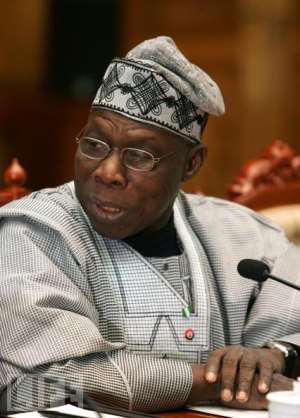
Addis Ababa, March 25, GNA - Some of Africa's leaders are responsible for instability on the continent because they have failed to manage diversity in their societies, the former Nigerian President, General Olusegun Obasanjo, has said.
By the same token, he noted, outside interference in Africa has been responsible for conflicts, citing the NATO air strikes in Libya in 2011 that led to the removal from power of Colonel Muammar Gaddafi.
'The repercussions are now being felt in Mali, Nigeria and the Sahel,' Gen Obasanjo told a press conference on the upcoming Tana High-Level forum on Security in Africa in Ethiopia.
Asked whether African leaders were to blame for the conflicts on the continent, he said: 'Yes and no.'
He said leaders were failing their people because they had not been able to prevent marginalisation in their societies; prevent injustice; reduce unemployment; reduce poverty; and that they had not embraced democracy and good governance.
The theme of his year's Forum is Africa in the Global Security Agenda.
This is apt, given the continuing fallout from the NATO intervention in Libya, for which US President Barack Obama recently criticised the British and French governments for getting rid of Gaddafi without having plans in place for effective 'follow-up'.
On the issue of African peacekeeping operations, Gen. Obasanjo agreed that the lack of funding from African Union members states was a major setback for peace and security on the continent.
He said that when he was head of state, he was in charge of a high-level panel to search for alternative sources of funding for the AU, but this came to nothing.
He noted that when the AU was looking for funds to counter the Ebola virus in Sierra Leone, Liberia and Guinea, member states failed to provide the money.
'The AU eventually had to turn to the private sector and it was able to raise $40 million,' said Gen Obasanjo, who is Chairman of the Tana Forum.
He was critical of AU member states for not contributing to the AU's general budget, adding: 'I think this is down to the lack of political will.'
Gen Obasanjo noted that Ebola and migration from Africa had security implications not just for the continent 'because we now live in a global community whereby if something happens in Africa, it affects the rest of the world'.
This was why Africa had to take a serious look at its security infrastructure; what Africans could do themselves to deal with these issues; and what should be the continent's role in formulating security policies globally.
The Deputy Chairman of the Forum, Professor Andreas Eshete of Ethiopia, said that Africa had to have not only a stronger voice in the global security architecture but also for its perspectives to be taken into account and incorporated into the global security agenda.
The fifth Tana Forum will take place in the Bahir Dar on April 16 and 17, attended by a number of heads of states and governments and members of the African peace and security community.
The general impression on peacebuilding initiatives in Africa has been that they have been eternally driven.
But in recent years Africans have been building a solid community around peacebuilding that has been coming up with solid ideas on how to tackle the problems relating to peace and security on the continent.
This is one reason why the Regional Economic Commissions (RECs) have been bold enough to pledge to 'silence the guns' in Africa by 2020.
Thus, the Forum, the brainchild of the late Prime Minister Meles Zenawi of Ethiopia, aims to provide a platform for airing African-led solutions to the continent's most pressing security problems.
The Institute for Peace and Security Services (IPSS) at Addis Ababa University serves as the Forum's secretariat.
GNA




 Former Kotoko Player George Asare elected SRC President at PUG Law Faculty
Former Kotoko Player George Asare elected SRC President at PUG Law Faculty
 2024 elections: Consider ‘dumsor’ when casting your votes; NPP deserves less — P...
2024 elections: Consider ‘dumsor’ when casting your votes; NPP deserves less — P...
 You have no grounds to call Mahama incompetent; you’ve failed — Prof. Marfo blas...
You have no grounds to call Mahama incompetent; you’ve failed — Prof. Marfo blas...
 2024 elections: NPP creates better policies for people like us; we’ll vote for B...
2024 elections: NPP creates better policies for people like us; we’ll vote for B...
 Don’t exchange your life for wealth; a sparkle of fire can be your end — Gender ...
Don’t exchange your life for wealth; a sparkle of fire can be your end — Gender ...
 Ghana’s newly installed Poland train reportedly involved in accident while on a ...
Ghana’s newly installed Poland train reportedly involved in accident while on a ...
 Chieftaincy disputes: Government imposes 4pm to 7am curfew on Sampa township
Chieftaincy disputes: Government imposes 4pm to 7am curfew on Sampa township
 Franklin Cudjoe fumes at unaccountable wasteful executive living large at the ex...
Franklin Cudjoe fumes at unaccountable wasteful executive living large at the ex...
 I'll 'stoop too low' for votes; I'm never moved by your propaganda — Oquaye Jnr ...
I'll 'stoop too low' for votes; I'm never moved by your propaganda — Oquaye Jnr ...
 Kumasi Thermal Plant commissioning: I pray God opens the eyes of leaders who don...
Kumasi Thermal Plant commissioning: I pray God opens the eyes of leaders who don...
